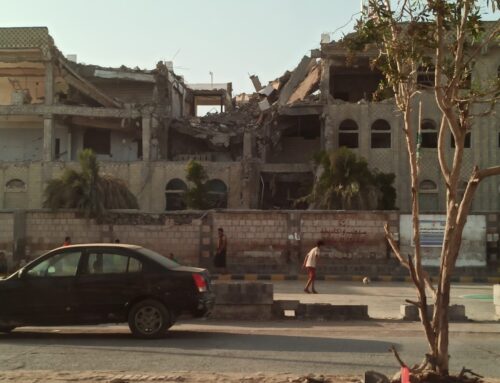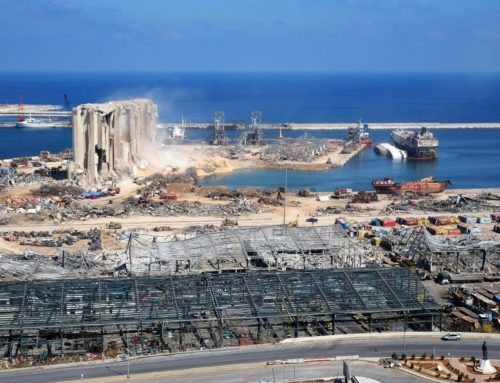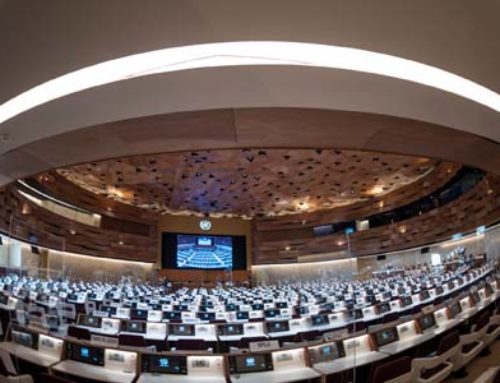
Mon – (25 Apr 2016)
His Excellency: UN Secretary General Special Envoy to Yemen
Mr : Ismail Ould Cheikh Ahmed
Distinguished : Representatives of Yemeni Parties in Kuwait Meeting
Salutation:
First of all, we’re pleased in Mwatana Organization for Human Rights to hail every effort aimed at putting an end of the war and rooting peace in Yemen; wishing that these efforts will bring about peace agreement between the parties to the conflict and different Yemeni political forces.
In this regard, we have eagerly received the announcement of a cease-fire agreement between the different parties to the conflict in Yemen, which commenced from 10 of current April, besides resuming the political path through a new round of negotiations scheduled to be held in Kuwait from April18,2016.
While great hopes are hinging on this significant opportunity and as some indicators signal to potential peace agreement may be realized in this round of talks in a way that can ensure ending the war and halting the bloody bleeding in Yemen, we have to urge you together to make this political negotiations give an ear to the voices of civilian victims of the conflict in Yemen and to explicitly put the priorities of human rights on the table where all political parties came together.
We are here very concerned to remind about the significant priorities that need to be incorporated in any foreseeable agreement; as we do believe that addressing such priorities will be helpful for any successful political settlement in the long-term, and will morally and humanitarianly enhance it. The most important priorities are the following:
- The Parties must be committed to endorse an international mechanism to investigate into the violations of human rights in order to find out the truth, preserve the rights of the victims and render them justice.
The episodes of violent conflict that have been ongoing in Yemen for more than two years have seen a wide variety of violations of human rights by all parties to the conflict. Thousands of civilians were killed and wounded while it doesn’t appear until now that there is any serious indication to conduct any investigation into these abuses in a way that ensure preserving the victims’ rights and rendering the compensation. The fact is that an important opportunity to establish an international committee to investigate into human rights violations in Yemen was wasted. That was due to lacking sufficient international support to a proposal suggested by the Netherlands. Therefore, the Netherlands had to withdraw its proposition submitted to the Human Rights Council in Geneva, the round of September 2015. So any political agreement should ensure that all Parties committed themselves to endorse an impartial international mechanism to look into all violations against human rights which occurred during the period of the conflict, with the aim of rendering justice and offering compensation to the victims.
- Disclose the fate of forcibly disappeared and release them.
- Yemen has seen during this war an unprecedented surge in the crime of forced disappearances committed by all parties involved in the warfare. Mwatana Organization has already documented dozens of the forced disappearance incidents in almost all Yemeni governorates; some of them are still persisting until the moment. Thereby, on top of these negotiations priorities should be a commitment made by all parties to unveil the destiny of the forcibly disappeared persons, set them free immediately and bring those responsible to court.
Furthermore, Yemen has inherited a very convoluted and complicated record of dozens—perhaps hundreds—of the forced disappearance cases, the victims of political conflict cycles since 1962 in the north and south of the country. The ordeal remained after the country re-union in May 1990 and it is still in existence until now. This issue is a persistent offense in which all previous and successive administrations are involved in—for not taking the lead in tackling it and for complicity in silencing it—by doing so those authorities have involved in unlawful acts are classified as a crime against humanity. Hence, in case that these negotiations have produced a road map for peace, Yemen will have a new chance to handle this dossier fairly and inclusively; ending the tribulation of the victims (the forcibly disappeared persons and their relatives) through initiating procedures that can address this file, halt the crime, disclose secret jails, shut them down in framework of a comprehensive settlement, and revealing the fate of all people who have been forcibly disappeared, and ensuring that such grave violations never be repeated.
- Release all outlawed detainees.
The outlawed arbitrary arrest incidents have represented the most prominent feature of the conduct by all parties to the conflict, each party in the areas under its own control in different Yemeni regions. Mwatana Organization for Human Rights has recorded dozens of arrest incidents in which the citizens were unlawfully detained by all parties all over the Yemeni regions. Many of these detainees were subject to beating, harsh and humiliating maltreatment. They were often arrested because of their own opinions and political affiliation or for being activists. The detainees included political activists, journalists and civil society activists. In this regard, all parties need to be urged to guarantee releasing all outlawed detainees, this matter should not be subject to political negotiating, but rather considering it a fundamental humanitarian right can’t be overstepped, moreover, authorities which are proved to be responsible for these violations must be held accountable.
– Investigate claims of torture and hold defendants accountable.
Since the onset of the crisis in Yemen and the eruption of the warfare throughout the period of the war until this round of negotiations which are held in Kuwait on April 18,2016, there have been multiple cases that were subject to torture and different forms of maltreatment and humiliation sometimes resulted in death. Dozens of politicians, journalists, activists and ordinary people were arbitrary arrested, forcibly disappeared people, who were released, revealed that they were tortured, suffered from different forms of maltreatment and humiliation inside the detention places. Thereby, it is very important to investigate all claims of torture and hold the wrongdoers accountable for their actions.
- Investigate outlawed murder and suppression, hold wrongdoers accountable.
The ongoing war in Yemen has led to different forms of human rights violations. Most notorious of all are the outlawed killing and extrajudicial executions, the mutilation of the dead bodies and trail corpses along the streets. Scores of incidents were registered in different Yemeni regions. These violations were committed by all parties to the conflict. Hence, a serious investigation into these violations is imperative in order to identify the wrongdoers and bring them to justice.
- Stop recruiting children and release all minor conscripts by all parties.
Beside the violations against children and the different damages inflicted upon the Yemeni children due to the war, the minor fighters have largely featured the current conflict in Yemen since the war has erupted. The children are being recruited largely by all parties to the conflict. This is one of the most notable violations against children. The picture of children militants has become very common in the streets and checkpoints—besides battle frontlines—in a way that is really an unprecedented feature in Yemen’s temporary history. Thereby, it is very important that all parties should vow to release all minor conscripts and ensure that children never be recruited in the future.
- Refurbish all schools that have been occupied and used by all parties to the war around the country.
- Schools in the areas of warfare were occupied and turned into military sites, destroyed partially or completely by all parties to the war. This is actually has been one of the main features of the war in Yemen. Consequentially, tens of thousands of pupils were denied access to education during the war time or later on because of the damages inflicted upon the schools so that they become unsuitable to receive the pupils. Therefore, it is vitally important to get all parties committed to evacuate schools, furthermore to ensure repairing them as an urgent priority to be suitable for use. The rehabilitation process should include—for creating a safe environment for children—removing landmines, the remains of weapons and ammunitions that constitute a lethal threat to the children’ lives and civilians as well.
- Lift restrictions against work of civil society organizations including arbitrary halting and occupying offices.
The ongoing war has swept way the environment of the civil society activity in Yemen. The civil society organizations (CSOs) have suffered from different violations. Several restrictions have been imposed upon the (CSOs), which largely curbed their activities. Most important restrictions were decisions of arbitrary halting and occupying the headquarters of the (CSOs). In this regard, all parties to the conflict should vow to lift restrictions unlawfully imposed upon the (CSOs) and to stop all kinds of arbitrary measures have been taken against them.
- Lift all restrictions imposed on media and freedoms of press including occupying offices, blocking websites and halt arbitrary decisions.
During the period of war, freedoms of press and expression as well as public freedom have experienced wide variety of violations. The different media outlets have been targeted by various violations including occupying the main offices, halting the operation of newspapers, local TV and Radio stations, some newspapers and electronic websites were also subject to confiscation and blocking. Meanwhile journalists were subject to intimidation, wide arrest campaign and even killing. Thereby, it is very important to initiate lifting all restrictions imposed on public and press freedoms such as arbitrary measures against media outlets, setting free all journalists who have been detained arbitrarily, investigating into all incidents of killing, assaulting and kidnapping that journalists were subject to; bringing the wrongdoers to stand before judiciary.
- Stop targeting human rights defenders and eliminate arbitrary measures against them.
The defenders of human rights were, and they are still, subject to a series of violations and arbitrary actions during the war. The anti-human rights activists campaign by all parties to the conflict included arrest, beat, ban from travel and urge fellows to attack them. So all parties should be urged to ensure the safety of the human rights advocators, eliminate all arbitrary measures and harassments against them.,
- Sign on and ratify Rome Statute of (International Criminal Court) in order to preserve the victims’ right, render justice and protect them in the future from violation and ending impunity policy.
This round of negotiations provides a significant opportunity to establish peace in Yemen that does require to bring to mind the importance of avoiding human rights violation in the future. To ensure non-recurrence of such violations, the Yemeni State-with an encouragement and support by the Yemeni political parties—should sign on and ratify the Rome Statute of the (International Criminal Court) so as to preserve the victims’ rights, bring them justice, and protect them against violations in future, as well as ensure eliminating the impunity policy.
- Open transitional justice track committed to international standards.
It falls upon your shoulders ,whetheras representatives of the UN or representatives of the Yemeni political forces, to prompt a genuine track of transitional justice that can help putting an end of the violations against human rights and eliminating the punishment escape policy, redressing grievances that thousands of thevictims of the violations of the earlier periods. The first step toward this end is drafting a bill of new law of transitional justice that should avoid the flaws incorporated in the drafts suggested earlier, and the presupposed draft must be in conformity with international principles of transitional justice. This initiative may come to its end by establishing mechanisms and executive procedures and a committee may come out of them.
- Enforce the role of judiciary and give law dominance over all security services.
It is very important to ensure that all parties need to be committed to promote and bolster the role of judiciary as an original authority entitled public sovereignty over individuals and entities; undertakes the responsibility for settling down disputes, handing own verdicts about individuals and entities whether they are guilty or innocent of any accusations against them, deciding penalties and enforcing them, rendering justice, protecting individuals’ rights and liberties, respecting law, never allowing any entity or group to neutralize the judicial job under whatever circumstances or justification.
All parties also need to ensure subjugating all security organizations and the detention places to the sovereignty of law, never allow neutralizing its job and mandates.
Mr: Ismail Ould Cheikh Ahmed
Distinguished: Representatives of Yemeni Parties in Kuwait Meeting
The priorities pertinent to the human rights referred to above is not an extra luxury nor a marginalized issue, but it is at the heart of Yemeni men and women daily life; particularly those who have been subject to wide variety of violations during the war, so peace can never be realized for them unless it is combined with preserving their rights and holding the wrongdoers accountable for their unlawful acts; ensuring that they will not be subject to such violations in the future. Hence, it falls upon your shoulders as the UN and these Yemeni political parties that are participating in the Kuwait negotiations to hear the voice of the victims and make sure that any political compromise will not come at their expense, rather it will be aimed to maintain their rights and create disconnection with all violations and maltreatment they suffered from earlier and they have continued until this moment.
Best Regards
Radhya Al-Mutawakel
Chairwoman of Mwatana Organization for Human Rights
April 18, 2016.





